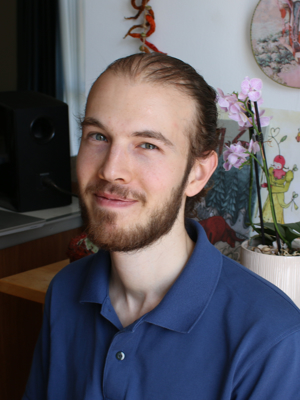03 June, 2025
OnlineAndOffline
Course Instructor:
Vakhtang Chapichadze, BSc (Maastricht University, Science Program), BA (Dickinson College)
Language of Instruction:
English
Course Fee:
770 GEL
There is also an option, to pay 100 GEL after registration in order to enrol in a group and then to proceed to payment 4 days before the start date (in such case 100 GEL will be deducted from the overall fee of 770 GEL)
Course Schedule:
-
Start Date: 3 June 2025
-
End Date: 4 July 2025
-
Lecture Days & Time:Tuesday & Friday, 14:00 – 16:00
Lecture Details:
- Lecture duration: 2 hours (including a 10-minute Q&A session)
- Lectures per week: 2 (4 hours total)
- Total number of lectures: 10 (20 hours in total)
Course Format:
HyFlex (Hybrid-Flexible)
This course offers a hybrid learning experience, combining in-person and online learning. Each lecture will be available in three formats:
- In-person - attend live at the venue
- Synchronous Online - live streaming via Zoom
- Asynchronous Online - pre-recorded video lectures available on Google Drive (Access to the videos will be available for two months following the completion of the course)
Certification:
Both physical and digital certificates will be issued upon completion of the course.
Course Prerequisite:
No prior knowledge in science or nutrition is required.
Adequate knowledge in the English language is required; however, no entrance exams or tests will be conducted for admission.
Minimum Age:
18 years old
Venue:
Sustainability Science Academy, 5 Marjanishvili Street, Tbilisi 0102, Georgia
Contact Details:
+995577508487
1. Introduction
The goal of this certification course is to provide the public with access to high-quality education on nutrition and health, grounded in modern research in biomedicine, nutrition science and healthcare. Participants will gain a comprehensive understanding of the latest prevention strategies aimed at improving quality of life and longevity. The course integrates evidence-based approaches to sustainable nutrition and functional medicine, equipping learners with the knowledge and skills necessary to make informed dietary and lifestyle choices.
2. Content of the Course
2.1 Course Description
Sustainable nutrition promotes dietary and lifestyle choices that not only prevent and help manage diseases but also address critical ecological challenges such as climate change, biodiversity loss, and soil degradation. It encompasses a holistic food culture that prioritizes human health and well-being while ensuring minimal environmental impact. Sustainable nutrition is economically viable, accessible to all, and socially just, making it an essential pillar of a sustainable future.
A key component of this course is functional medicine, which differs from conventional medicine by focusing on identifying and treating the root causes of diseases rather than merely managing symptoms. Functional medicine develops individualized treatment plans tailored to each person’s unique needs, considering diet, lifestyle, genetics, and biochemistry. Additionally, this course will critically examine the influence of the food industry on scientific research and public perceptions, enabling participants to discern credible information from misinformation.
2.2 Core Topics
This transdisciplinary course integrates biomedical literature, nutrition science, and biological and chemical health mechanisms. Rather than adopting a narrow scientific perspective, it offers a holistic approach to health and nutrition, treating individuals as psycho-physical beings rather than mere disease cases. Using scientific principles, participants will explore the root causes of diseases and learn to develop balanced dietary and lifestyle strategies for optimal health and well-being.
Key topics covered in this course include:
- The role of macronutrients, vitamins and minerals in human health
- The biology and treatment of major chronic diseases
- The impact of fasting and intermittent fasting on epigenetics
- Critical analysis of modern dietary trends, their benefits, and drawbacks
- The "Blue Zones" phenomenon—regions where people live exceptionally long and healthy lives
- Gut microbiota and its influence on the immune system and overall health
2.3 Teaching Approach
The course is built on internationally recognized scientific research and insights from leading experts in the field, including Denis Burkitt, Caldwell Esselstyn, Walter Kempner, Nathan Pritikin, Colin Campbell, Ancel Keys, Richard Moore and others. By examining their work, participants will gain a deeper appreciation of how scientific evidence informs best practices in nutrition and health.
As Georgia progresses toward integration with the European Union, aligning with EU commitments to sustainable healthcare, improved health, and overall well-being is crucial. This course contributes to that effort by fostering a scientifically sound and sustainable approach to nutrition, empowering individuals to take proactive steps toward better health while promoting environmental responsibility.
3. What You'll Learn
- The various forms of proteins, fats, carbohydrates, vitamins, and minerals, and how they impact health and well-being.
- The differences between traditional and modern dietary patterns, and their influence on quality of life.
- The fundamental principles and research underpinning sustainable nutrition.
- The scientific research behind modern dietary recommendations and nutritional guidelines.
- The biology of major chronic diseases, their primary causes, and comprehensive treatment approaches.
- The latest biomedical research on fasting, epigenetics, gut microbiota, stem cells, and other recent discoveries.
- The toxicology of key pollutants in both the global and local environment (with a focus on Georgia) and strategies to avoid their presence in our environment and food.
- EU dietary recommendations and plans for sustainable nutrition, health, and well-being.



